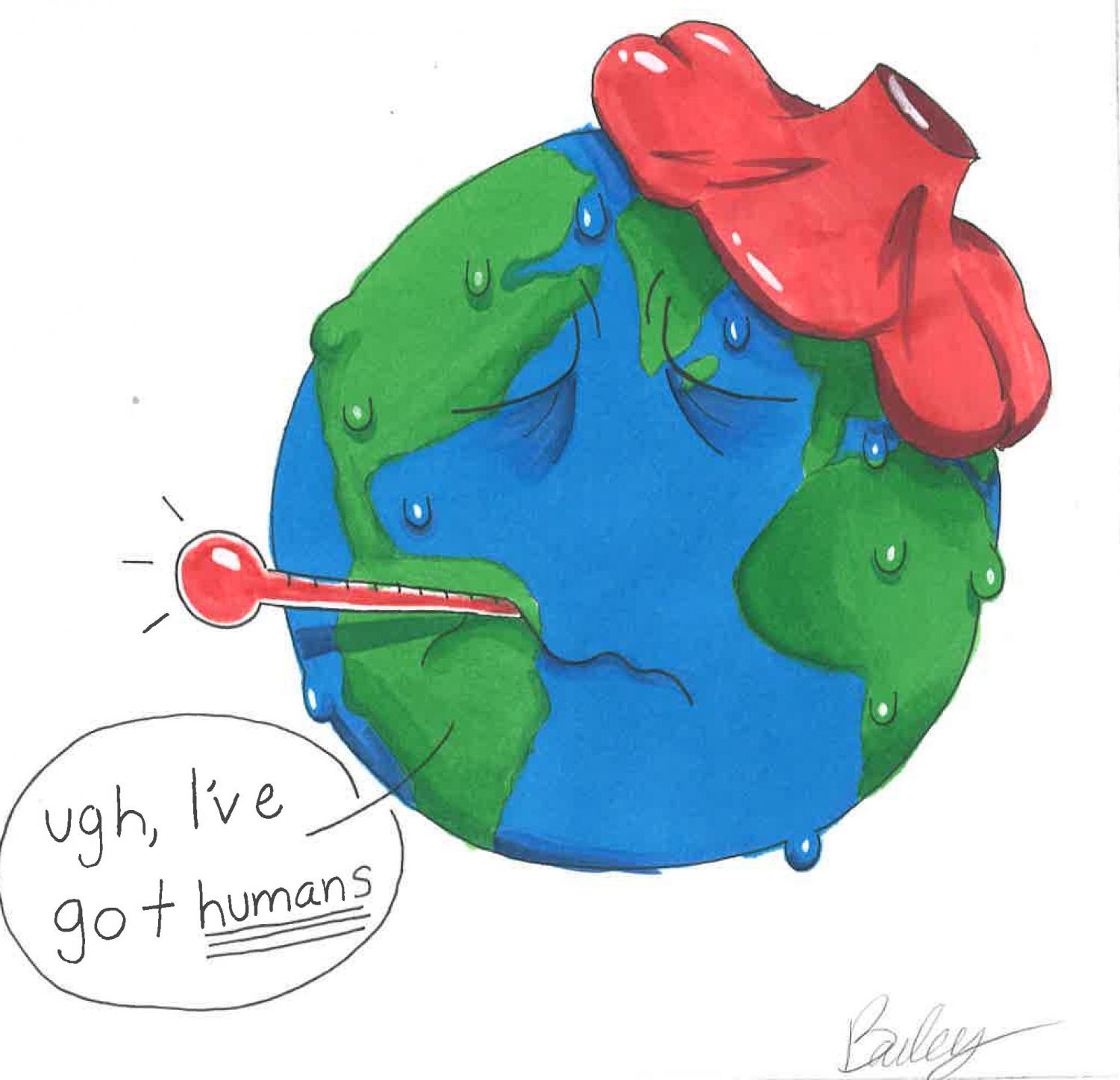A Dying Planet
How climate change is affecting the regular weather patterns
January 21, 2020
“Climate Change” seems to be a controversial term these days, but many scientists and activists are begging for people to pay attention and see the signs that it is real and creating an increasingly dangerous environment for us all. According to National Geographic “Climate change influences severe weather by causing longer droughts and higher temperatures in some regions and more intense deluges (floods) in others, say climate experts.”
[aesop_parallax height=”200px” img=”https://lhstoday.org/wp-content/uploads/2020/01/FALL-1-e1579634075367.png” parallaxbg=”on” parallaxspeed=”2″ captionposition=”bottom-left” lightbox=”off” floater=”off” floaterposition=”left” floaterdirection=”none” overlay_revealfx=”off”]
Winter- Many people believe that climate change can be debunked at the first sight of snow but scientists believe that can be a side effect of climate change. The Environmental Defense Fund reports that “There is more moisture in the warmer atmosphere. So when the temperatures are below freezing, snowfall can break records. And scientists are studying a possible connection between a warming Arctic and cold spells in the eastern United States. The idea is that a rapidly warming Arctic can weaken the jet stream, allowing frigid polar air to travel farther south.”
[aesop_parallax height=”300px” img=”https://lhstoday.org/wp-content/uploads/2020/01/FALL-2-e1579634058879.png” parallaxbg=”on” parallaxspeed=”2″ captionposition=”bottom-left” lightbox=”off” floater=”off” floaterposition=”left” floaterdirection=”none” overlay_revealfx=”off”]
Spring- Spring is arriving sooner, which doesn’t sound like a big deal but its affecting the timing of environmental changes. According to Conservation in a changing climate, “Shifting seasons are directly linked to warmer global temperatures. A slight change in temperature is enough to push the spring thaw earlier, and delay the first frost until later in the fall. These environmental changes cause many trees and spring wildflowers to bloom earlier than typical. As a result, winters are shorter, spring is earlier, summers are longer and fall arrives later.”
[aesop_parallax height=”300px” img=”https://lhstoday.org/wp-content/uploads/2020/01/FALL-3-e1579634038614.png” parallaxbg=”on” parallaxspeed=”2″ captionposition=”bottom-left” lightbox=”off” floater=”off” floaterposition=”left” floaterdirection=”none” overlay_revealfx=”off”]
Summer- Of course we all know summer to be sweltering, but each summer seems to last longer than the last, with higher temperatures. According to Yale Climate Connections the lingering effects of climate change are increasingly dangerous. “With fewer strong extratropical cyclones, weather patterns may linger longer in the same place, increasing the odds of long-lasting, dangerous heat waves. The changing conditions may also enable air pollution to build up in cities.”
[aesop_parallax height=”300px” img=”https://lhstoday.org/wp-content/uploads/2020/01/FALL-e1579633971196.png” parallaxbg=”on” parallaxspeed=”2″ captionposition=”bottom-left” lightbox=”off” floater=”off” floaterposition=”left” floaterdirection=”none” overlay_revealfx=”off”]
Fall- Due to climate change fall foliage, or the falling of leaves, is pushed back. The Yale Climate Connections says, “In the eastern United States, fall foliage arrives an average of two weeks late compared to the 1980s and 1990s, said Yingying Xie, an ecologist at Northwestern University.” Though this may seem insignificant, fall foliage is going to push back further and further, meaning that fall is going to push itself back further and further.
How Climate Change Affects Extreme Weather

The effects of climate change have increased at an alarming rate.
Climate change is creating increasingly dangerous and extreme weather. Heatwaves have recently increased in temperature and period of heatwaves in effect. According to Global Change, “the number of intense heat waves being almost triple the long-term average. The recent heatwaves and droughts in Texas (2011) and the Midwest (2012) set records for highest monthly average temperatures. Analyses show that human-induced climate change has generally increased the probability of heatwaves.” NASA has collected ample evidence that climate change is the cause for our planet warming, “The planet’s average surface temperature has risen about 1.62 degrees Fahrenheit (0.9 degrees Celsius) since the late 19th century, a change driven largely by increased carbon dioxide and other human-made emissions into the atmosphere. Most of the warming occurred in the past 35 years, with the five warmest years on record taking place since 2010. Not only was 2016 the warmest year on record, but eight of the 12 months that make up the year — from January through September, with the exception of June — were the warmest on record for those respective months.”
The rising heat is melting glaciers which are creating higher sea levels which in turn creates increasingly dangerous hurricanes. The Union of Concerned Scientists links the intensity of hurricanes to climate change. “While hurricanes are a natural part of our climate system, recent research suggests that there has been an increase in intense hurricane activity in the North Atlantic since the 1970s. In the future, there may not necessarily be more hurricanes, but there will likely be more intense hurricanes that carry higher wind speeds and more precipitation as a result of global warming. The impacts of this trend are likely to be exacerbated by sea-level rise and a growing population along coastlines.”
Global warming affects our whole planet and we are, and will continue to suffer the consequences of a dying planet. Scientists have known and seen the data behind the dangers of a warming planet but it is being denied by many people. Climate change is real-there are stats, facts and photographic evidence of it. Climate change isn’t a politics matter. It’s science that is actively killing our planet and killing us.